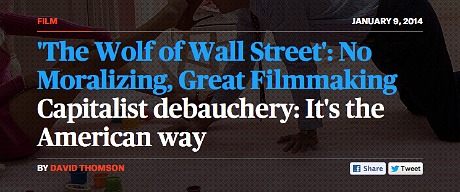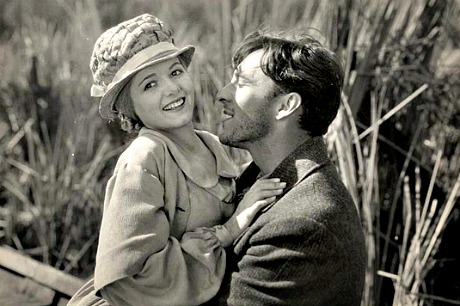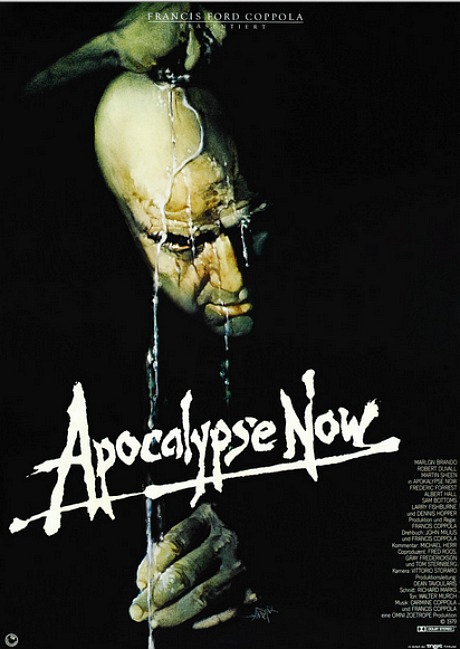A warm and extraordinary story of how a frowning, middle-aged, brillo-haired scold tried to berate kindly Walt Disney and his creative team into removing the songs and the animated penguins from Mary Poppins, and how the smiling forces of bubbly musical happiness pushed back and resisted these efforts…thank God! The frowning scold finally went home, and then three years later she invited herself to the Poppins premiere at Grauman’s Chinese. Your heart will melt, your spirit will soar.
 Jeffrey Wells
Jeffrey Wells
Box At The Doorstep
An “ironic” American Hustle gold chain and pendant arrived today along with a soundtrack CD. A harmless little promotional nudge…fine. But what are you supposed to do with it? Certainly not wear it. Even in an ironic context ugly bling is ugly bling. There hasn’t been a lot of swag this season. Or at least none that I’ve been the recipient of. Where are the plastic bottles containing 25 or 30 fake Lemmon 714s from Paramount? That would be awesome. A great party item. Not that I want this stuff in my life. But whatever arrives, you want it to either (a) edible or (b) of some practical use or (c) aesthetically agreeable. Or a comination of all three.

Sincere Gratitude
Every day 25% to 35% of HE comments are smart, witty, thoughtful, etc. If there’s a dispute or a rant of some kind the authors try to express it clearly and concisely. If there’s some kind of dry, satirical thrust to an article or riff I’ve written, these people will usually get this and acknowledge same by kicking the humor around or turning the tables in some other direction. Okay, maybe 40% of responders respond this way on a good day. But over half of HE responders, I’ve noticed, tend to ignore or dismiss pretty much everything I write. Their agenda is the same no matter what — dismissals, low-rent snark, bad jokes, scolding acid baths, hellfire-and-brimstone sermons, spray piss, therapeutic counseling and other ways of taking rhetorical dumps. Pure kneejerk. I’m just taking a moment to offer sincere thanks to the minority that engages with intelligence and perception and a semblance of respect. What I do is hard to define but I know it’s not the usual usual. Blunt replies, fine. Shoot from the hip, go to town. Harshly phrased arguments, okay. But not every single thing is a fucking joke. Seriously — without sincere responders writing this daily column would be awful. Your voices are heard daily and very much appreciated.
“Beautiful and Liberated”
Martin Scorsese‘s The Wolf of Wall Street “is not just the funniest [film he’s] ever made but the first in which there is an authentic daring,” writes New Republic critic David Thomson in a 1.9.14 post. “The film is so much plainer than Casino or GoodFellas; the jukebox of hits fades in and out but doesn’t insist that we guzzle on its high-octane drive. The nerve-wracked Scorsese has made not just a comedy of situation and language, of dementia and stupidity, but even a physical farce. There is a sequence where Jordan Belfort, luded to the gills, has to get home from the country club in his white sports car. It is a slapstick tour de force that deserves to stand with Jerry Lewis and Laurel & Hardy. The Wolf of Wall Street is a transforming celebration of Leonardo DiCaprio that annihilates the lofty emptiness of The Great Gatsby.”

Ron Howard’s Splash
That kicker riff right after Leo’s final howl says to the viewer “get it?” If you ask me Paramount’s marketing team is basically saying “we’re not afraid of the Academy’s Hope Holiday voters…we’re not trying to mollify or soft-peddle the content of The Wolf of Wall Street…our movie owns the crazy…the water in the face is but one aspect or manifestation of this year’s ‘I drink your milkshake!’ marketing campaign for an edgy film. We are what we are, Marty’s movie is what it is and yes, Jordan Belfort‘s life really was this manic and insane but it’s still a metaphor, man…either you get it or you don’t.”
2014 Eddie Haskell Noms
For years the annual awards handed out by the American Cinema Editors have been called “the Eddies.” Simple enough, accepted by all. I don’t know who suggested they should be re-named the Eddie Haskell Awards, but it’s obviously a lame idea. The name Eddie Haskell, synonymous with smarmy unctuous behavior, contains no allusion to film editing and…well, it just makes no sense at all. (I’ve read that the 70 year-old Ken Osmond, who portrayed Haskell on the ’50s TV series Leave It To Beaver, has requested that the ACE board of directors drop the idea and continue to call the awards the plain old “Eddies.”)
In any event the 64th annual Eddie noms, which reflect the same group-think, consensus-driven, kiss-ass mentality that has pervaded all award-bestowing industry orgs, are as follows: Best Edited Feature Film (Dramatic): 12 Years a Slave, Captain Phillips, Gravity, Her, Saving Mr. Banks. Best Edited Feature Film (Comedy or Musical): American Hustle, August: Osage County, Inside Llewyn Davis, Nebraska, The Wolf of Wall Street. Best…I can’t do this. It’s just another aspect of the same consensus choices that everyone else has focused upon. Here’s an Awards Daily rundown.
Yes, I know — a Best Picture Oscar nominee that hasn’t been nominated for Best Editing is presumed not to have as good as chance as one that has been so nominated, etc.
All I can say is that it was a lot more fun making up stupid shit about Eddie Haskell than reciting and reprinting the facts. Becket, I’m bored.
Sunrise
The next time I visit Berlin I’m going to visit to F.W. Murnau‘s grave at Stahnsdorf cemetery. Last night I watched Fox Home Video’s new Bluray of Murnau’s Sunrise (1927), which I hadn’t seen since…I forget but sometime in the early ’80s. We all know it’s a work of pure cinematic poetry and a masterpiece of compassion and redemption, but I’d forgotten (a) how long those extended tracking shots by dps Charles Rosher and Karl Struss go on (truly groundbreaking for their day), (b) how design aspects of the amusement-park sequence resemble Fritz Lang‘s Metropolis, (c) the heartbreaking current between Janet Gaynor and George O’Brien, (d) the subdued acting styles (i.e., not entirely naturalistic but certainly leaning toward subtle by the standards of 1920s emoting), and (e) how much better Sunrise is than Murnau’s absolutely over-rated Nosferatu, which I saw for the first time not long ago and was mildly disappointed by.

Janet Gaynor, George O’Brien in F.W. Murnau’s
LeBeouf Is Bailing…For Now
Nobody can fathom why Shia Lebeouf simply didn’t admit to “sampling” a Daniel Clowes comic-book character (i.e., Justin M. Damiano) at the beginning of HowardCantour.com, his recently released short film. All he had to do was say “ripped off from Daniel Clowes…due respect but this was the process.” But no — he tried to pass it off as an original.
In any event, Lebeouf has now tweeted that he’s “retiring from all public life.” Not really. He’s just an emotional guy who’s throwing up his hands and saying “fuck it” for the time being. He’s feeling heavily assaulted and is basically taking a vacation from the slings and arrows. He’ll be back in a year or so. His Clowes plagiarism thing was an artistic felony, of course, but he presumably learned a lesson. I’m guessing that he’s retiring like Frank Sinatra retired in ’68 and like Steven Soderbergh is retired now.
Little Seen
A black-and-white version of this Apocalypse Now art appeared in the N.Y. Times Sunday Arts & Leisure section a week or so before Francis Coppola‘s epic opened on 8.15.79. To my knowledge it was never used again — not as a one-sheet during the theatrical run, and not on any jacket art for VHS, laser disc, DVD or Bluray versions, etc. I was living back then in a cockroach-infested Sullivan Street two-room flat and working at the Spring Street Bar & Grill. I clearly remember seeing this ad and saying to myself “Wow, this is gonna be good.”

You Can’t Say “Excited”
In the realm of press releases no word is more phony sounding than “excited.” Whenever someone is hired by a company of any size they’re always, always “excited” about a great opportunity; ditto their employers; ditto any creative or business person or senior management type embarking on any entrepreneurial, cooperative or corporate venture. “Excited” is so ubiquitous it’s almost scary. Because people in the business world refuse, bizarrely, to use any other word. Like it’s some kind of code. It’s so commonly used you can pretty much count on the person using it being…I don’t want to say they’re a political zombie but they’re certainly looking to blend in. I’m serious — anyone who says “I am very excited about this opportunity” in a press release can and should automatically be perceived as a joiner, a go-alonger, a Zelig, a drone. If you’ve seen the John Carpenter film They Live, you know what kind of person I’m talking about. Why am I the only person who’s ever mentioned this? (I riffed on it three or four years ago.)
“Thick Machine Noise”
The following portion of Dr. Svet Atanasov‘s July 2011 review of Optimum’s Don’t Look Now Bluray was music to my ears: “Unfortunately, I must speculate that additional corrections were performed that have affected its integrity“…yes! “Specifically, a layer of occasionally thick machine noise has been applied, possibly to sharpen the image and reduce film grain, which has a tendency to degrade detail and clarity”…oh, come on, it’s not that bad! “On medium size screens (52″ to 55”), the majority of the subtle image degradations would likely remain unnoticed by most viewers, though the sporadic harshness of the image would still bother those who are sensitive to post-production sharpening”…not me, Svet! I watched this Region-2 Bluray last night, and if you ask me Svet is a nitpicking whiner. Yes, there are traces of digital scrubbing but the grain is reduced and that’s what counts. (Nobody loathes grainstorms like yours truly…I am the king of that aesthetic.) It’s not a great-looking Bluray but it’s mostly a very handsome transfer of a classic chiller. I honestly don’t think I’ve ever seen it look this good, even with the digital noise. Seriously. Tonight: Billy Liar and Sunrise.

No Grandpa Shoes
I was standing next to the great Bruce Dern at last Saturday night’s Palm Spring Film Festival gala. He was wearing a tux, smiling and chatting, posing for photos. And I happened to look down and notice that he wasn’t wearing a pair of uptown Bruno Magli or John Varvatos or even Florsheim evening shoes (shiny black leather, a genuine or pseudo-Italian “statement”, lace-ups or buckles) but what looked like black running shoes or, worse, orthopedic comfort shoes. Right away I came up with my own Dernsy: “Jesus, I love the guy…he’s gotta be the greatest raconteur in the world and his Oscar campaign has been inspired, and then he kinda screws it up — in the eyes of discerning journalists, at least — a little bit anyway — by wearing old man shoes!”

Let me explain something: I’ve walked around the streets of Rome, Milan and Florence on warm evenings, and white-haired Italian guys never, EVER wear comfort shoes. It’s a point of pride. They would rather be stricken with a heart attack and collapse on the street than wear those clunky things. I’m not saying old guys can’t wear comfortable shoes at home or while walking around the neighborhood or the mall, but when you’re out at night and hanging with the swells you have to wear classy, high-style, Cary Grant-at-El Morocco footwear, even if it hurts. Even if it shortens your life.”
